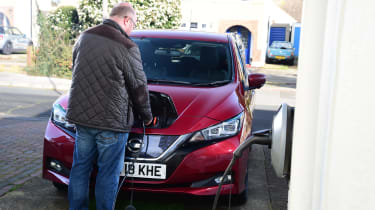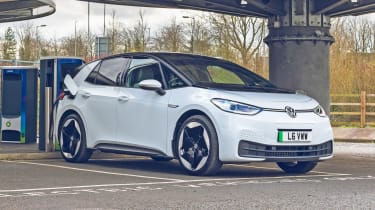How much does it cost to charge an electric car?
It should cost less to run an electric car than a combustion one, but exactly how much does it cost to charge one up?
With the world currently transitioning towards electric cars it is important to understand what this means for your wallet. Electric cars can be quieter, faster and more relaxing to drive than petrol or diesel cars, but one of the most important benefits of EV ownership in many people’s opinion is that they’re generally much cheaper to run.
Electric cars are currently exempt from road tax (VED) and the London Congestion Charge until 2025, plus maintenance costs can be lower, as some EVs won’t need to be serviced nearly as often as petrol or diesel cars do.
But what is the cost of charging an electric car? There are multiple ways to charge at home or using the UK’s public charging network, and the cost varies widely. It differs depending on multiple factors, including where you charge, when you charge, your car’s battery size, how much charge you need and what speed you charge at.

We’ve detailed everything you need to know about the cost of charging your electric car and what to expect when charging below…
Cost of charging at home
A big upside to owning an electric car is the ability to charge it at home. You’re able to get your car ready for the next day's driving by plugging it into your wallbox and charging overnight, but there are plenty of charging solutions now available for those without off-street parking including a new £350 grant that contributes towards the purchase and installation of a chargepoint for those who don’t have private parking. You can check eligibility on the GOV website. The government’s now discontinued ‘Go Ultra Low’ campaign calculated that 90% of electric-car charging is done at home.
It's not recommended that you do this, but it’s possible to use a conventional three-pin plug to charge an electric car. No installation is needed to use a three-pin plug, you just plug into the nearest socket with a suitable cable which usually comes as standard with EVs, but not always. This method of charging is the slowest possible, with some manufacturers quoting upwards of 30 hours to charge to 100%, and recommending that you only use it as a last resort if it’s not possible to use a wallbox.
Alternatively, most make the choice to install a home wallbox. Home chargers can supply power at between 3.7 and 22kW, but most operate at around 7kW. The prices of these units vary between brands but, for example, a Pod Point Solo 3 home charger capable of 7kW speeds and with a cable built-in will cost £1,049 to purchase with a standard installation. It’s worth doing your research, as there are plenty of options for other companies that can supply 7 or 7.4kW home wallboxes, and those without a cable built-in may save you money.

As of May 2024, the average cost of electricity in the UK is 24.5 pence per kilowatt-hour (kWh). So if you're using a 7kW wallbox to fully recharge a Volkswagen ID.3 with a 77kWh battery, it would take a little over nine hours, and cost you almost £19. With the ID.3’s claimed range of up to 347 miles, that works out to around 5 pence per mile.
For a rough comparison, a petrol car returning 30mpg would cost around 22p per mile to fuel and a car returning 40mpg would cost approximately 17p per mile to fuel, based on the UK average fuel cost of 149.96 pence per litre for unleaded petrol.
Comparatively, if an electric car was covering 4 miles for every kWh of the battery then that would cost around 6p per mile, and if it reduced down to 3 miles for every kWh then it would increase to 8p per mile. So even with today’s high energy prices, electric cars charged at home are still cheaper to fuel.
Cost of public charging and charging at motorway services
As a rule, you should expect to pay a lot more when charging an electric car with a public charger in comparison to charging at home, however exact costs depend on the charger you visit. The UK has just over 61,000 public chargers which are run by various charging networks, each with their own pricing structures, and some can achieve much faster speeds than most home wallboxes.
Using Gridserve Electric Highway as an example, you're likely to find some of the company's chargers if you stop at a service station. Prices currently start at 49p pence per kilowatt-hour if you’re using a slower AC charger (up to 22kW), while you also have the option to use Gridserve’s ‘High Power’ chargers (up to 350kW), which currently cost 79p/kWh.
At 79p/kWh, a 10-80% top-up of a 77Wh Volkswagen ID.3 would cost around £42 and give you around 277 miles of range in return. It’s worth finding out what your car’s fastest charging rate is, if you don’t already know – there’s no point in paying a premium to use a 350kW ultra-rapid charging point if the car itself can only charge at 100kW maximum, when there may be a slightly slower and cheaper charging point you could use instead.
Other major charging networks in the UK to look at include Osprey (up to 79p per kWh), MFG (79p per kWh), Shell Recharge (up to 79p per kWh), BP Pulse (up to 79p per kWh), InstaVolt (75p per kWh), IONITY (74p per kWh) and Tesla Supercharger (average 64p/kWh). If you are a frequent user of one of these networks it may be worth registering with them as some, such as BP Pulse, offer discounted rates for subscribers or registered users.
You can use Zap-Map’s website or app to find the nearest locations to you, as well as see the most up-to-date pricing information.
